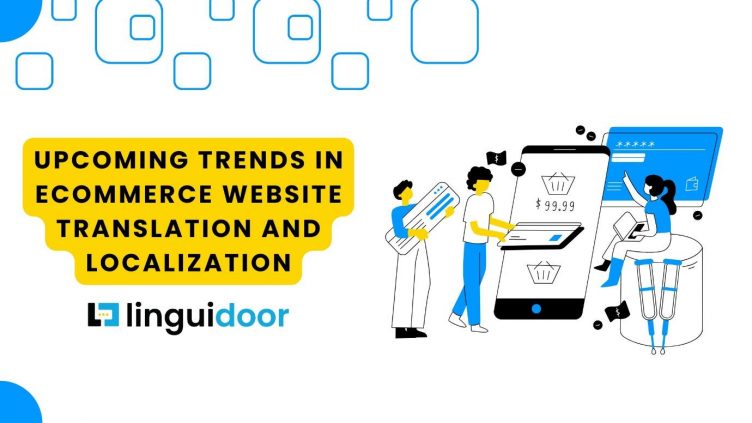Upcoming Trends in Ecommerce Website Translation and Localization

Today, every business is striving to expand its global presence – the need to cater to international markets and expand business horizons is greater than ever – and the e-commerce industry is no different. As more people around the world shop online, e-commerce companies are realizing the importance of speaking their customers' languages and understanding their cultural preferences. This realization has led to a sharp increase in demand for e-commerce website translation and localization services. Website translation aims to localize the online shopping experience of customers, making it more accessible and relevant to people in different regions.
But the world of technology is constantly evolving. New trends are quickly taking over the old. A flurry of technological advancements is steadily changing the localization industry too. To stay relevant, e-commerce businesses must keep up with the latest trends.
In this blog, we’ll be exploring the latest trends that are transforming the e-commerce website translation industry – making it easier for businesses to amplify their customer base, boost their sales, and augment their ROI. But before that, let’s answer the most probable question:
Why is E-Commerce Website Translation and Localization Required?
Let’s understand this with an example:
“Benvenuti nel nostro negozio online! Siamo felici di offrirvi una vasta gamma di prodotti di alta qualità. Sfoglia il nostro catalogo e trova ciò che fa al caso tuo. Grazie per averci scelto!”
Can you interpret what’s written above?
Probably, no! But now you can:
Welcome to our online store! We are happy to offer you a wide range of high-quality products. Browse our catalog and find what suits you best. Thank you for choosing us!”
That’s the power of Website Translation and Localization. It helps your customers navigate your website with ease, understand your product offerings, and find (and purchase) what they are looking for.
By speaking their language, both literally and figuratively, you create a borderless and personalized shopping experience that resonates with their needs and preferences.
Multilingual communication helps you break language barriers, build trust, drive engagement and conversions, and ultimately drive more business!
Website Translation and Localization Trends That Will Impact the E-Commerce Industry
Now, let’s look at some of the trends that are revolutionizing website translation and localization industry:
1. Increasing Adoption of AI in Localization Tasks
One of the significant changes driving the website translation industry is the use of Artificial Intelligence (AI). AI-powered tools are quickly gaining popularity and have greatly improved the efficiency and accuracy of the website translation process. Businesses are increasingly adopting AI translation services for website localization. However, AI is not infallible. It is prone to errors and mistakes, especially when it comes to understanding nuances and cultural elements. That’s why, human intervention is greatly required to maintain high standards of accuracy.
The year 2024 will see an increased adoption of AI + Human-powered translation approach in e- commerce website localization services.
2. Greater Focus on Global Customer Experience
The way you treat your customers can either make or break your business. Customer experience, today, has become a huge differentiator and goes beyond the functionality of a product or service. It encompasses the entire customer journey, right from initial brand discovery to post-purchase interactions.
Website translation services play a huge role in accentuating a brand experience. By adapting your website's content, imagery, and user experience to different languages, cultures, and your user’s browsing habits, you can create a more engaging and personalized experience for your global audience. This will not only help in building trust and loyalty but will also set you apart from competitors in the global marketplace.

3. Shifting Localization Demands
Today, translation and localization are not limited to traditional languages like English, Spanish, French, and German. Languages such as Mandarin Chinese, Arabic, Russian, and Portuguese too have gained immense prominence. Thanks to their increasing economic influence and digital connectivity of regions where they are spoken.
Due to this, the demand for translation services in different languages continues to grow. To stay agile, it has become important for e-commerce websites to diversify their linguistic capabilities as per the emerging market trends.
4. Rising Demands of Hyper-Personalization in Localization
When it comes to online shopping, customers expect extremely personalized experiences. They want companies to tailor their products, services, and content recommendations to their specific needs.
This trend is increasingly growing. E-commerce translation services providers have already started using advanced analytics tools and algorithms to help companies tailor their localization efforts to the specific needs of each customer. This can involve using different languages, cultural references, and even product or content recommendations to reflect cultural preferences.
5. Surge in Voice Seach Localization
Voice search technology has become a turning point in digital marketing. It is changing the way consumers interact with e-commerce websites. As voice assistants grow in popularity, e-commerce websites – and other businesses – must focus on adapting to this technology. This includes:
- Optimizing website content for voice search queries
- Adopting multilingual SEO strategies to improve search engine ranking
- Localizing content as per the language, regional dialect, and cultural nuances
By optimizing content as per the linguistic diversity of their target markets, e-commerce businesses can establish stronger connections with users and improve their sales and ROI.
The Bottom Line
Website translation and localization is no longer a luxury. It has become a business necessity that helps e-commerce and other companies serve diverse global customers. But, to make the most of website translation and localization services, businesses need to keep up with the latest trends. This requires careful planning and strategic execution.
Partnering with a specialized e-commerce website translation and localization services provider can help you stay ahead of the curve and thrive in the rapidly evolving digital landscape.
Ready to make an impact? Contact us today and take a giant leap toward global success.

Made up your mind yet?
Empower your globalization goals today!




